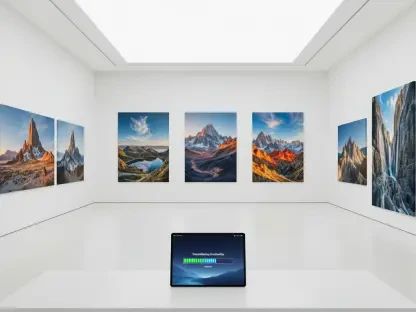Imagine a market where over 38 million active social media users are shaping consumer trends at an unprecedented pace, turning digital platforms into powerful engines for brand engagement and economic growth in Nigeria. In 2025, this is not a distant vision but a vibrant reality unfolding across the country. The nation’s digital media landscape has emerged as a cornerstone of Africa’s emerging markets, driven by a youthful, tech-savvy population and rapid technological advancements. This report delves into the transformative potential of Nigeria’s digital media sector, exploring how it offers unparalleled opportunities for brands and investors ready to tap into one of the continent’s most dynamic economies.
The Rise of Nigeria’s Digital Media Landscape
Nigeria’s digital media sector stands as a beacon of growth, positioning the country as a leader in Africa’s digital transformation. With a population where 60% are under the age of 25, the nation boasts a demographic primed for digital adoption, fueling sectors like social media, entertainment, and social commerce. The expansion of 4G and 5G networks has further accelerated internet penetration, while innovations such as AI-driven tools are redefining how content is created and consumed across platforms.
Key players like Flutterwave, a fintech giant facilitating seamless transactions, and Chowdeck, a logistics startup revolutionizing food delivery, exemplify the innovation driving this space. These companies are capitalizing on the tech-savvy youth who demand fast, accessible digital solutions. Entertainment platforms and streaming services are also gaining traction, reflecting a shift toward on-demand content consumption that mirrors global trends but with a distinctly local flavor.
Government initiatives, such as the National Digital Economy Policy and Strategy, play a supportive role by fostering an environment conducive to tech adoption. This policy framework aims to bridge infrastructure gaps and promote digital inclusion, ensuring that the benefits of this boom reach beyond urban centers. As a result, Nigeria’s digital media landscape is not just growing but reshaping the way businesses connect with consumers on a continental scale.
Key Trends and Market Dynamics
Social Media Explosion and Consumer Behavior Shifts
The surge in social media usage in Nigeria is staggering, with 38.7 million active users driving a cultural and commercial shift in 2025. Platforms like TikTok, with a user growth rate of 56.9% over recent years, and X, showing a 31.7% increase, have become central to how Nigerians interact with brands. These platforms are more than social hubs; they are marketplaces where trends are born and consumer preferences are shaped in real time.
Consumer behavior has evolved dramatically, with 86.2% of Nigerians relying on social media for brand research before making purchase decisions. The rise of micro-influencers, particularly nano-influencers on TikTok who achieve engagement rates as high as 800%, highlights the power of authenticity over traditional advertising. Brands are increasingly partnering with these influencers to build trust and foster deeper connections with audiences.
Social commerce emerges as a game-changer in this ecosystem, with 76% of consumers making purchases directly influenced by social media content. This trend transforms platforms like Instagram and WhatsApp into direct sales channels, enabling businesses to bypass conventional e-commerce barriers. For brands, this presents a unique opportunity to integrate marketing and sales strategies seamlessly, leveraging real-time data to tailor offerings to consumer needs.
Growth Projections and Economic Impact
Looking ahead, Nigeria’s digital media sector is poised for robust expansion, with a projected compound annual growth rate of 15–18% through 2030. The entertainment and media market alone is expected to reach a value of $13.6 billion by 2028, underscoring the sector’s economic significance. These figures reflect not just growth but a fundamental shift in how value is created and captured in the digital space.
Beyond revenue, the economic impact is evident in job creation and the empowerment of small and medium enterprises. AI tools are reducing operational costs for SMEs by up to 40%, enabling them to compete with larger players while scaling efficiently. This democratization of technology fosters innovation at the grassroots level, contributing to a more inclusive economy.
Digital transformation, valued at $26.98 billion in Nigeria, continues to drive brand engagement and attract investment. As businesses adopt data-driven strategies and personalized marketing, consumer loyalty strengthens, creating a virtuous cycle of growth. Investors eyeing long-term returns will find this sector a fertile ground, with scalability and impact extending across multiple industries.
Challenges in the Digital Media Ecosystem
Despite its promise, Nigeria’s digital media sector faces significant hurdles that could temper growth if left unaddressed. Inconsistent internet access, particularly in rural areas, remains a critical barrier to digital inclusion. This limits market reach for brands and stifles the potential for widespread adoption of digital services, creating a divide between urban and rural consumers.
Regulatory uncertainties further complicate the landscape, posing risks to startups and potentially dampening investor confidence. Ambiguities in policies governing data usage and platform operations can lead to operational disruptions, especially for smaller firms lacking the resources to navigate complex compliance requirements. This unpredictability underscores the need for clearer guidelines to sustain momentum.
Mitigation strategies, however, offer a path forward. Hybrid business models, such as offline payment gateways integrated with digital platforms, help bridge connectivity gaps. Additionally, strategic partnerships with international firms and local stakeholders diversify revenue streams, reducing reliance on volatile market conditions. These adaptive approaches are essential for maintaining resilience in a rapidly evolving sector.
Regulatory Framework and Compliance Considerations
The regulatory environment in Nigeria provides both a foundation and a challenge for digital media growth. The National Digital Economy Policy and Strategy stands out as a pivotal framework, promoting tech adoption and infrastructure development. This policy signals the government’s commitment to positioning Nigeria as a digital leader, encouraging innovation across sectors.
Compliance with data protection and cybersecurity standards is equally critical in building consumer trust and attracting international capital. As digital transactions increase, safeguarding user information becomes paramount to prevent breaches that could erode confidence. Firms adhering to these standards are better positioned to forge partnerships and expand their global footprint.
Government support, while promising, must evolve to address emerging needs and potential regulatory shifts. Policies that balance innovation with oversight will ensure operational stability for businesses. The interplay between regulation and growth will shape how quickly the sector can scale, making it imperative for stakeholders to stay attuned to policy developments.
Future Outlook: Innovation and Investment Horizons
Emerging technologies like AI-driven personalization and predictive analytics are set to redefine brand engagement in Nigeria’s digital media space. These tools enable hyper-targeted campaigns that resonate with individual preferences, enhancing customer experiences. As adoption grows, businesses can expect improved conversion rates and stronger market positioning.
Potential disruptors, including global economic fluctuations and local infrastructure challenges, could influence the trajectory of this sector. However, advancements in areas like fintech integration and clean energy solutions, exemplified by companies such as Arnergy, offer new avenues for growth. These innovations align with global priorities, making them attractive to investors focused on sustainability and impact.
Nigeria’s hyperconnected youth and supportive policies will sustain long-term expansion, with future growth areas emerging in ESG-aligned initiatives and niche tech solutions. The convergence of local ingenuity and global investment trends positions the country as a hub for digital innovation. Stakeholders who prioritize adaptability and forward-thinking strategies will likely reap the greatest rewards.
Conclusion: Seizing the Digital Opportunity
Reflecting on the insights uncovered, it becomes evident that Nigeria’s digital media boom has carved a transformative path for brands and investors alike. The sector’s rapid growth, fueled by social media engagement and technological innovation, has positioned the nation as a powerhouse in Africa’s digital economy. Challenges such as connectivity gaps and regulatory hurdles have been met with resilient strategies, showcasing the adaptability of local startups.
Moving forward, stakeholders should prioritize swift engagement with trends like social commerce and micro-influencer marketing to maximize returns. Investing in infrastructure partnerships to bridge rural-urban divides could unlock untapped markets, while aligning with data protection standards would build lasting consumer trust. These actionable steps offer a roadmap for navigating the evolving landscape.
Ultimately, the focus should shift toward fostering collaborations between government, businesses, and international investors to sustain momentum. By leveraging Nigeria’s unique demographic strengths and embracing emerging technologies, the digital media sector could solidify its status as a prime destination for long-term investment. The opportunity has never been clearer for those ready to act decisively.









